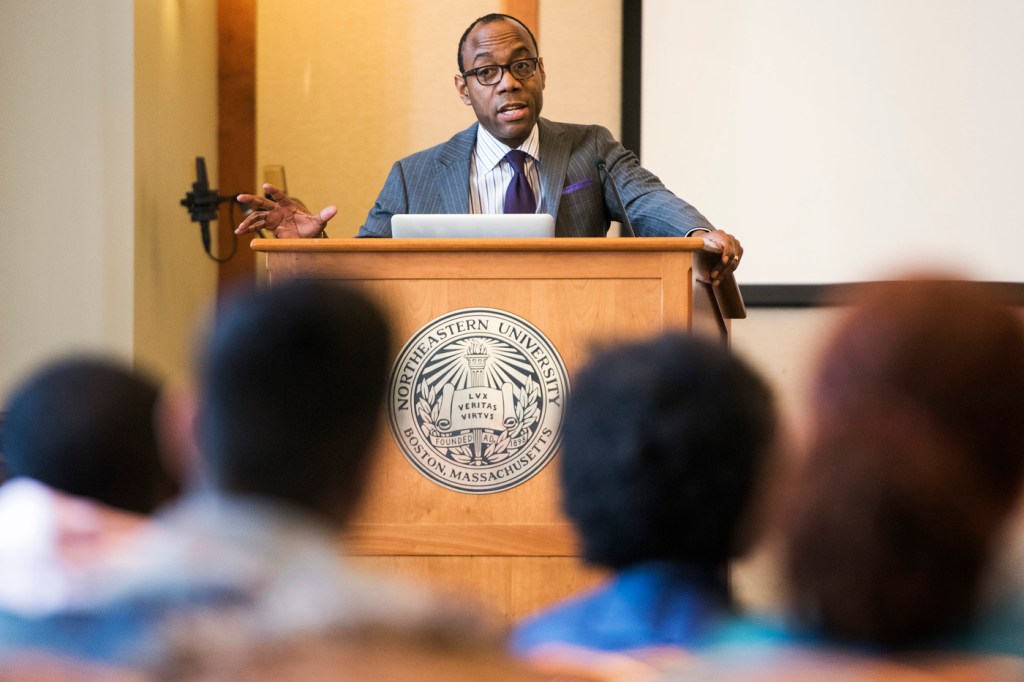Northeastern, NAACP president consider ‘What would Dr. King do now?’

As part of Northeastern’s weeklong celebration of the life and legacy of Martin Luther King Jr., the university hosted prominent city and community leaders on Thursday to discuss civil rights issues facing America today and in the future.
Cornell William Brooks, president and CEO of the NAACP, and Tanisha M. Sullivan, president of the NAACP’s Boston chapter, joined students, faculty, and staff in the Curry Student Center Ballroom to examine the question, ‘What would Dr. King do now?’
Richard O’Bryant—director of the John D. O’Bryant African American Institute, which co-sponsored the event with the Civil Rights and Restorative Justice Project—opened the discussion by compelling attendees to “keep asking ourselves the question, ‘What would Dr. King do now?’
“You have to think about what you can do in your small area of responsibility to make a difference,” he said. “It’s important for us to take a stand now for what we believe in.”
Brooks echoed that sentiment, saying, “We find ourselves in this Curry Center at a peculiar and particular moment in American history, at the crossroads of tumult and triumph, of crisis and chaos.
“It is a moment in American history where so many feel a deep sense of being anxious and fearful about what is to come. It is a moment in our democracy where we see across the length and breadth of our republic a millennial generation of woke activists who, with their minds, their hearts, and bodies are yet declaring with conscience and conviction in the words of William Shakespeare, ‘Now is the winter of our discontent.’

Law students Ariel Goeun Kong, left, and Tara Dunn spoke at an event honoring Martin Luther King Jr. Photo by Adam Glanzman/Northeastern University
Speaking passionately, Brooks urged attendees to hold closely three tenants of King’s scholarship—that people have intrinsic value; that we are interdependent; and that there is a moral order to the universe—in working to continue the civil rights work King took up more than 50 years ago.
Brooks referenced a Navy veteran named Middle Passage who died marching with the NAACP from Selma, Alabama, to Washington, D.C., in 2015. “Middle did not give his life in vain; Martin Luther King did not give his life in vain; Rosa Parks did not sacrifice her life in vain; you are not giving your lives to justice in vain; there is a moral order to the universe, and you can, with God, create justice, create peace, make a better world and a better democracy and a better country for us with his or her help. You have that power.”
Other speakers echoed Brooks, calling for vigilance and action.
Tara Dunn and Ariel Goeun Kong, both L’17, discussed their work through the Civil Rights and Restorative Justice Project to resolve decades-old racially-motivated homicide cold cases. Dunn told the story of meeting a family of the victim in a case from the 1940s, particularly noting that the family hadn’t been able to speak to anyone about the case in the 70 years prior.
“Our duty as a younger generation is to ensure that the suffering of these families is not swept aside,” she said. “Stop waiting for others to be that change; be that catalyst that this generation has been waiting for.”
Later, Fatuma Mohamed, SSH’20, recited a portion of King’s 1964 Nobel Peace Prize acceptance speech, and Robert Jose, associate dean of Cultural, Residential, and Spiritual Life, urged those in attendance to “think deeply about how we can move forward in a productive way together.”
Melvin J. Kelley IV, the Elizabeth Ann Zitrin Teaching Fellow, emphasized the importance of the work being done by the Civil Rights and Restorative Justice Project. He noted that its archive of racially-motivated homicides—which, once completed, will be the most comprehensive such archive in the country—includes King.
“Which is really quite fitting,” Kelley said, “because his life and legacy fuels our efforts.”





